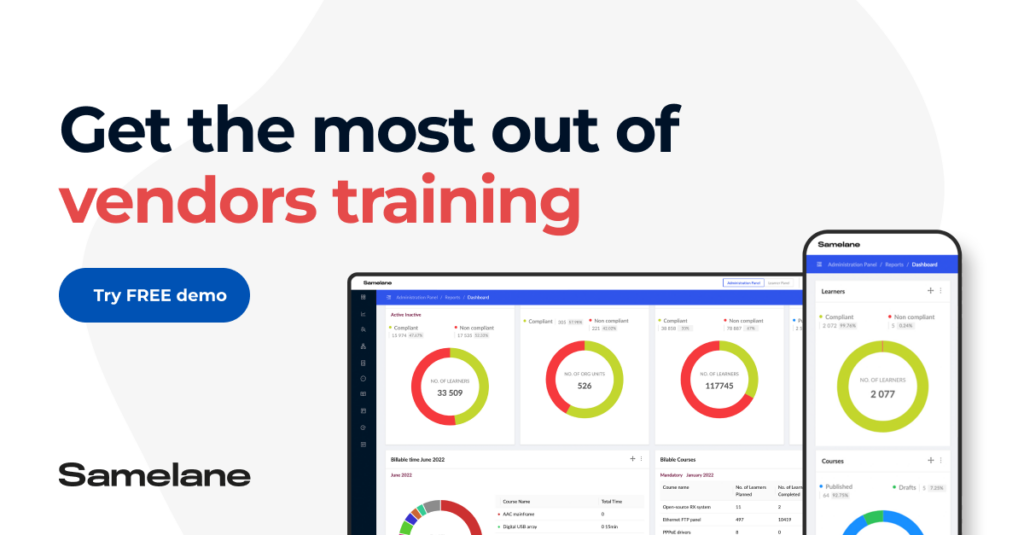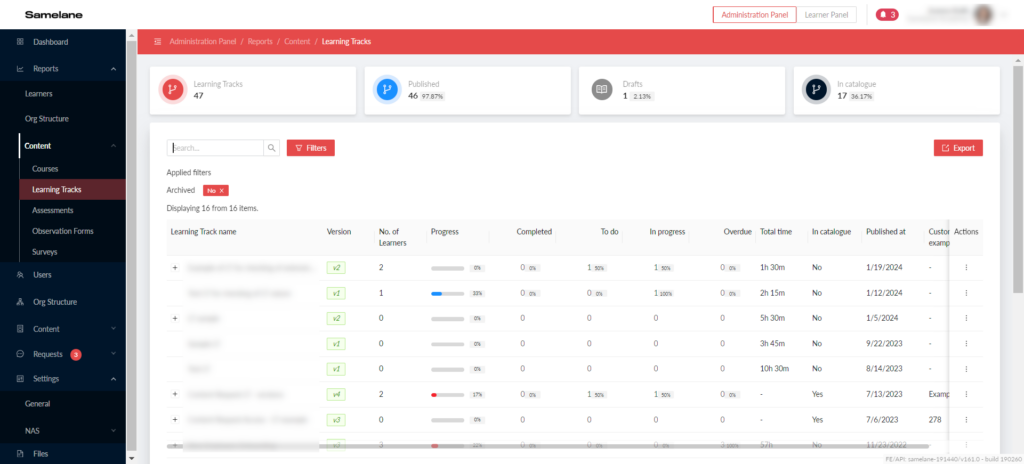Effective vendor management is crucial to maintaining a competitive advantage and ensuring the smooth operation of supply chains. An integral element of solid vendor management is training for vendors, which equips them with the knowledge and skills needed to meet the standards and expectations of your company. However, standard offline training involves costs of training logistics, problems in maintaining compliance, and current knowledge. All this affects the effectiveness of training and training overload.
This article explores the empowering potential of an LMS (Learning Management System) designed for vendors. It’s not just a tool but a reliable and efficient solution that can revolutionize vendor management. With its user-friendly interface, comprehensive training materials, and automated tracking features, an LMS can empower vendors, making them feel more capable and valued in their training process, and pave the way for a more productive and mutually beneficial partnership.

Understanding the Challenges of Vendor Training
Low Training Adoption: Low training uptake occurs when providers do not use the training materials provided. This may be due to various factors, including irrelevant content, lack of accessibility, or insufficiently engaging training. As a result, suppliers may need help to keep up with changes and guidelines, which may lead to inconsistencies in the delivery of products or services or lower than expected sales results
Training Overload: Conversely, training overload happens when vendors are overwhelmed with too much information. This can lead to confusion, decreased information retention, and a lack of key practices and standards implementation. Overload often results from considering the vendors’ capacity to absorb and apply information effectively within their operational constraints.

Leveraging an LMS for Effective Vendor Training
1. Tailored Content for Maximized Results
An LMS can help you create and deliver content tailored to your suppliers’ needs and challenges. By tailoring training modules to real-world scenarios that providers encounter, an LMS increases the relevance and applicability of content. This alignment encourages higher engagement rates because providers can see relevant content that will directly benefit them from participating in the training.
2. Enhancing Credibility with Vendor Training Certification
Incorporating a Vendor Training Certification program within your LMS elevates the credibility and value of your training initiatives. Certifications are tangible proof of vendors’ commitment to excellence and proficiency in specific areas, making it a powerful tool for differentiation in competitive markets. This recognition boosts the vendors’ confidence in their skills and enhances their reputation among clients and peers.
By implementing certification programs, you can set clear benchmarks for training completion and competency, ensuring that all vendors meet your quality standards. Moreover, certification can motivate vendors to fully engage with the training content, knowing their efforts will be formally recognized and rewarded.
3. Flexible and Accessible Learning Paths
One of the most significant advantages of an LMS is its ability to offer flexible and accessible learning opportunities. Vendors can access training materials from anywhere and anytime. This flexibility ensures that vendors can engage with the training at their own pace and according to their schedules, significantly reducing the barrier to entry for participation.

4. Engaging Content Formats including AR
Engagement is critical to successful learning outcomes. An LMS for vendors can include interactive elements such as quizzes, AR simulations, and gamified learning experiences. These elements make the learning process more engaging and enjoyable, increasing the likelihood of uptake and completion. Additionally, interactive components can improve knowledge retention, ensuring that vendors can effectively apply what they’ve learned.
5. Data-Driven Insights for Continuous Training Improvement
An LMS doesn’t just deliver training; it also provides valuable insights into how it is consumed. Tracking engagement metrics, completion rates, and assessment outcomes can highlight areas where the training might need to be more dense or engaging. These insights allow companies to continuously refine and improve their training programs, ensuring they remain effective and do not lead to overload.
Summing up: Enhancing Vendor Training Adoption with LMS platform
Practical vendor training balances ensuring comprehensive knowledge transfer and avoiding information overload. By leveraging the capabilities of an LMS designed for vendors, companies can deliver personalized, engaging, and flexible training programs.
Such programs facilitate higher training uptake and guard against the risk of overload, paving the way for stronger vendor relationships and improved operational efficiency. In embracing these advanced educational tools, businesses can foster a collaborative and knowledgeable vendor network, which is essential for thriving in today’s competitive marketplace.
Sign up for a free demo and check how to implement training for vendors in your organization.











